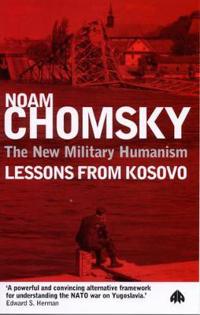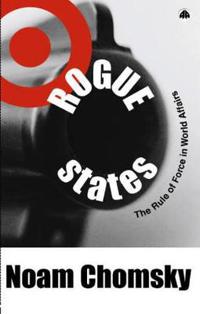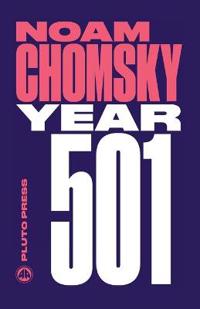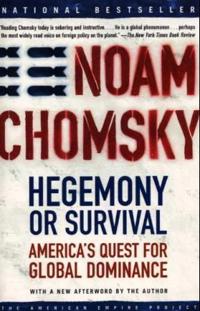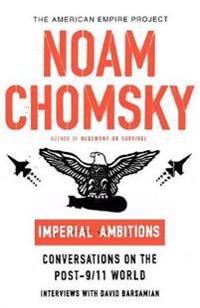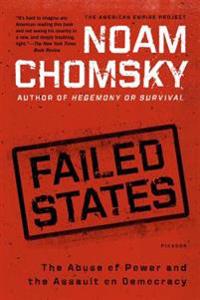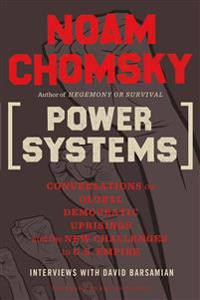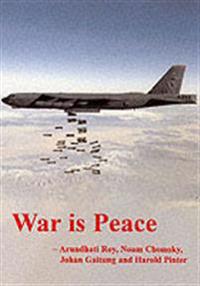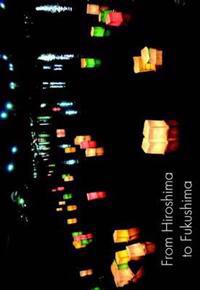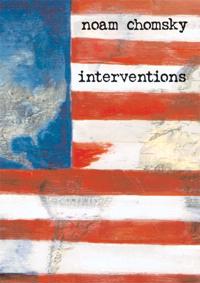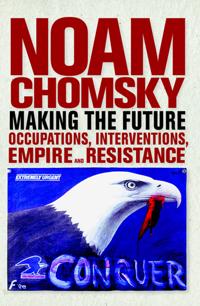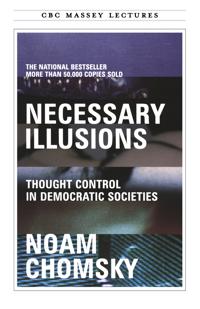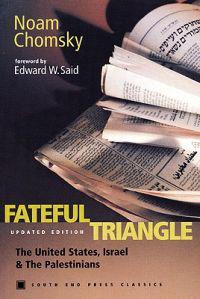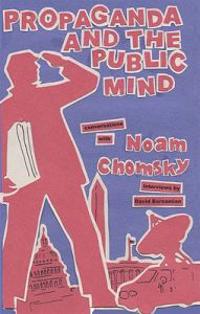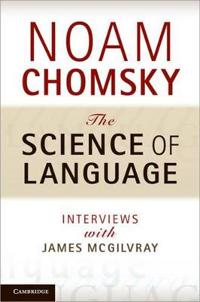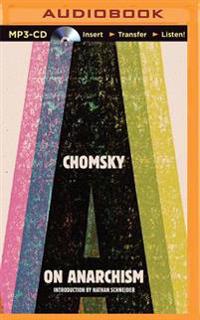The Fateful Triangle (Pocket)
avNoam Chomsky
ISBN: 9780745315300 - UTGIVEN: 1999-05-01In a revised and updated edition, Chomsky untangles the intricacies of the US-Israeli-Palestinian relationship. He covers the significant developments of the 1980s and 1990s, aiming to provide a corrective to the mythmaking that has obscured the real history of "peace" negotiations in the region.[...]
The New Military Humanism (Häftad)
avNoam Chomsky
ISBN: 9780745316338 - UTGIVEN: 199910'A powerful and convincing alternative framework for understanding the NATO war on Yugoslavia.' Edward S. Herman 'Thank God for Noam Chomsky ...Ruthless in his analysis of Nato's lies, relentless in his emphasis on the parallels between Kosovo, Central America and Turkey, he believes that this year[...]
Rogue States (Häftad)
avNoam Chomsky
ISBN: 9780745317083 - UTGIVEN: 2000-09Noam Chomsky argues that, contrary to popular perception, the real 'rogue' states in the world today are not the dictator-led developing countries we hear about in the news, but the United States and its allies. He challenges the legal and humanitarian reasons given to justify intervention in global[...]
Voices from the Other Side (Pocket)
avKeith Bolender, Noam Chomsky, Keith Bolender
ISBN: 9780745330402 - UTGIVEN: 201008Since the early 1960s, few other countries have endured more acts of terrorism against civilian targets than Cuba, and the US has had its hand in much of it. This book gives a voice to the victims. Keith Bolender brings to bear the enormous impact that terrorism has had on Cuba's civilian population[...]
Power And Terror (Pocket)
avNoam Chomsky, Andre Vltchek
ISBN: 9780745331379 - UTGIVEN: 2011-04-20Noam Chomsky analyses US foreign policy in the Middle East in the 10 years since 9/11. Includes 3 previously unpublished essays.[...]
A New Generation Draws The Line (Pocket)
avNoam Chomsky
ISBN: 9780745332345 - UTGIVEN: 2011-11-16The year 1999 saw two major international crises which, looked at side-by-side with characteristic acuity by Chomsky, starkly illuminate the strategies of the Western powers in the new century. "(Chomsky is) one of the West's most influential intellectuals in the cause of peace".--"The Independent".[...]
On Western Terrorism (Pocket)
avNoam Chomsky, Andre Vltchek
ISBN: 9780745333878 - UTGIVEN: 2013-09-20A controversial and provocative new intervention from the world's greatest dissident intellectual.
Rethinking Camelot: JFK, the Vietnam War, and U.S. Political Culture (Pocket)
avNoam Chomsky
ISBN: 9780745335421 - UTGIVEN: 2015-09-20In a potent act of myth busting, Noam Chomsky turns his critical gaze upon the Kennedy Administration and draws controversial parallels between the Presidency of JFK and that of Ronald Reagan. With particular focus on the Vietnam War, Rethinking Camelot shows that Kennedy had little intention in wit[...]
Culture of Terrorism (Pocket)
avNoam Chomsky
ISBN: 9780745335438 - UTGIVEN: 2015-09-20Chomsky ends his preface to The Culture of Terrorism with the words, "As the latest inheritors of a grim tradition, we should at least have the integrity to look in the mirror without evasion". The tradition to which he is referring is none other than the Western imperial project and in encouraging [...]
Year 501 (Häftad)
avNoam Chomsky
ISBN: 9780745335476 - UTGIVEN: 2015-03Exploring "the great work of subjugation and conquest" which began with Columbus, in Year 501 Chomsky surveys the history of American imperial power in the ensuing 500 years that followed. Touching on everything from the British in India to the Americans in Beirut, Year 501 is a searing condemnation[...]
Hegemony or Survival: America's Quest for Global Dominance (Häftad)
avNoam Chomsky
ISBN: 9780805076882 - UTGIVEN: 200409Lucidly written, thoroughly documented, and featuring a new Afterword by the author, "Hegemony or Survival" is today's most influential thinker's definitive statement on America's alleged quest for global dominance.[...]
Imperial Ambitions: Conversations on the Post-9/11 World (Häftad)
avNoam Chomsky, David Barsamian
ISBN: 9780805079678 - UTGIVEN: 2005-10A collection of previously unpublished interviews presents the critical thoughts of the noted scholar, activist, and author of Hegemony and Survival on American foreign policy in the increasingly unstable global community following September 11th, sharing his views on the invasion and occupation of [...]
Failed States: The Abuse of Power and the Assault on Democracy (Häftad)
avNoam Chomsky
ISBN: 9780805082845 - UTGIVEN: 200704The sequel to Hegemony or Survival offers a comprehensive analysis of the foreign and domestic policies of the United States--a global superpower that has long claimed the right to reshape other nations while its own democratic institutions are in severe crisis and its policies and practices have re[...]
Power Systems: Conversations on Global Democratic Uprisings and the New Challenges to U.S. Empire (Häftad)
avNoam Chomsky, David Barsamian
ISBN: 9780805096156 - UTGIVEN: 201301A compelling new set of interviews on our changing and turbulent times with Noam Chomsky, one of the world's foremost thinkersIn this new collection of conversations, conducted from 2010 to 2012, Noam Chomsky explores the most immediate and urgent concerns: the future of democracy in the Arab world,[...]
War is Peace (Häftad)
avArundhati Roy, Noam Chomsky
ISBN: 9780851246604 - UTGIVEN: 2001-12Addresses some of the urgent questions which have been posed by the war in Afghanistan.
From Hiroshima to Fukushima (Häftad)
avNaomi Klein, Noam Chomsky, Raymond Williams
ISBN: 9780851248097 - UTGIVEN: 201111Edited by Tony Simpson
Tony Simpson - Editorial: From Hiroshima to Fukushima
Terumi Tanaka - Hibakusha and Fukushima
Hachiro Sato - Fukushimaâs Quagmire
Helen Caldicott - Fukushimaâs Radioactive Elements
Seiji Takato - Black Rain
[...]Interventions (Häftad)
avNoam Chomsky
ISBN: 9780872864832 - UTGIVEN: 200707Interventions by Noam Chomsky is getting new press after the Pentagon banned the book from Guantanamo Bay's prison library. "The""Miami Herald" broke the story on October 11, 2009 and stories followed in "The Washington Independent," the "Boston Herald," and other outlets. "Democracy Now " picked up[...]
Making the Future (Häftad)
avNoam Chomsky
ISBN: 9780872865372 - UTGIVEN: 201108"Unwavering political contrarian Noam Chomsky smart-bombs the U.S. military's global "Interventions" (City Lights). Shock and awe!"--"Vanity Fair""Making the Future" presents more than fifty concise and persuasively argued commentaries on U.S. politics and policies, written between 2007 and 2011.Tak[...]
Necessary Illusions: Thought Control in Democratic Societies (Häftad)
avNoam Chomsky
ISBN: 9780887845741 - UTGIVEN: 2013-09In his 1988 CBC Massey Lecture, Noam Chomsky inquires into the nature of the media in a political system where the population cannot be disciplined by force and thus must be subjected to more subtle forms of ideological control. Specific cases are illustrated in detail, using the U.S. media primaril[...]
Fateful Triangle: The United States, Israel, and the Palestinians (Häftad)
avNoam Chomsky, Edward W. Said
ISBN: 9780896086012 - UTGIVEN: 199904ContentsForeword by Edward W. Said
Preface to the Updated Edition
1. Fanning the Flames
2. The Origins of the "Special Relationship"
3. Rejectionism and Accommodation
4. Isreal and Palestine: Historical Backgrounds
5. Peace for Galilee
6. Aftermath
7. The Road to Arma[...]Propaganda and the Public Mind: Conversations with Noam Chomsky (Häftad)
avDavid Barsamian
ISBN: 9780896086340 - UTGIVEN: 200105Renowned interviewer David Barsamian showcases his unique access to Chomky's thinking on a number of topics of contemporary and historical import. In an interview conducted after the important November 1999 "Battle in Seattle," Chomsky discusses prospects for building a movement to challenge corpora[...]
The Science of Language (Häftad)
avNoam Chomsky
ISBN: 9781107602403 - UTGIVEN: 201203Noam Chomsky is one of the most influential thinkers of our time, yet his views are often misunderstood. In this previously unpublished series of interviews, Chomsky discusses his iconoclastic and important ideas concerning language, human nature and politics. In dialogue with James McGilvray, Profe[...]
On Anarchism (Övrigt)
avNoam Chomsky, Nathan Schneider
ISBN: 9781491582923 - UTGIVEN: 2014-11"On Anarchism" provides the reasoning behind Noam Chomsky's fearless lifelong questioning of the legitimacy of entrenched power. In these essays, Chomsky redeems one of the most maligned ideologies, anarchism, and places it at the foundation of his political thinking. Chomsky's anarchism is distinct[...]
On Anarchism (CD-bok)
avNoam Chomsky, Nathan Schneider
ISBN: 9781491586549 - UTGIVEN: 2014-11"On Anarchism" provides the reasoning behind Noam Chomsky's fearless lifelong questioning of the legitimacy of entrenched power. In these essays, Chomsky redeems one of the most maligned ideologies, anarchism, and places it at the foundation of his political thinking. Chomsky's anarchism is distinct[...]


